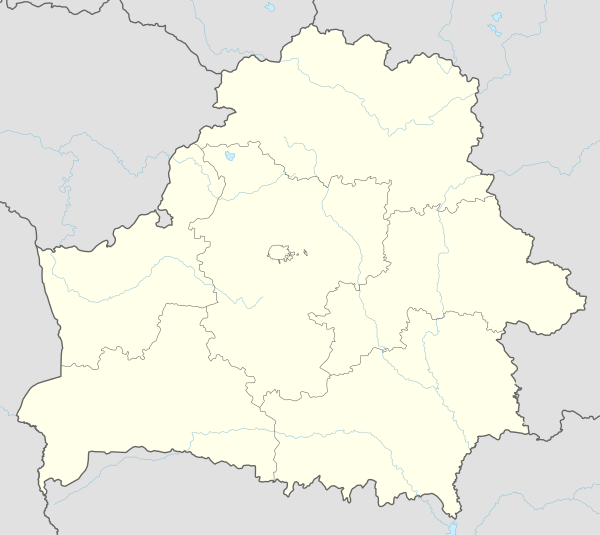Dubrowna
Dubrowna (Belarusian Дуброўна Dubroŭna, Polish: Dąbrowna) or Dubrovno (Russian: Дубро́вно) is a small town on the Dnieper River. The toponym originates from a Proto-Slavic term for an oak forest, which may explain the inclusion of oak leaves and acorns in the town's coat of arms. Dubroŭna is the administrative centre of the Dubroŭna Raion of the Vitebsk Voblast in northern Belarus.
Dubrowna Dubroŭna | |
|---|---|
| Дуброўна Дубровно | |
 Flag  Coat of arms | |
 Dubrowna | |
| Coordinates: 54°34′N 30°41′E | |
| Country | |
| Voblast | Vitebsk Region |
| Raion | Dubrowna District |
| Elevation | 170 m (560 ft) |
| Population | |
| • Total | 9,100 |
| Time zone | UTC+2 (EET) |
| • Summer (DST) | UTC+3 (EEST) |
| Area code(s) | +375 2137 |
In the 19th century Dubroŭna was a centre for weaving.[1] The town had a significant Jewish community that in 1898 formed more than half of its population.[1]
During World War II Dubrovno was heavily affected. It was occupied by German forces July 17–20, 1941, and the town's Jews were killed.[2] It was the scene of considerable partisan activity. From October 1943 to June 1944 it was at or near the front line, and was not finally reoccupied by Soviet forces until June 26, 1944.
Dubroŭna hosts an annual folk song and dance festival, "Dnepr voices in Dubrovno".[3]
Famous people born in Dubrowna
- Harry Batshaw (1902–1984), jurist
- Israel Dov Frumkin (1850–1914), journalist
- Charles Jaffé (c.1879 - 1941), chess master
- Brothers Yakov Polyakov, Samuel Polyakov (1837–1888) and Lazar Polyakov (1843–1914), businessmen
- Kazimierz Siemienowicz (c.1600 - c.1651), military engineer and rocket pioneer
- Anna Tumarkin (1875–1951), professor of philosophy
- Menachem Ussishkin (1863–1941), Zionist
- Zvi Zeitlin (1922-2012), violinist
References
- Rosenthal, Herman; Janovsky, S. "Dubrovna". JewishEncyclopaedia.com. Retrieved 20 April 2010.
- Catherine Merridale, Ivan's War: Life and Death in the Red Army, 1939-1945 (Macmillan, 2007: ISBN 0-312-42652-6), p. 38.
- "Culture". Vitebsk Oblast Executive Committee. Archived from the original on 30 November 2010. Retrieved 20 April 2010.
External links
- Dubroŭna Raion Executive Committee
- Global Anabaptist Mennonite Encyclopaedia Online
- Jewish Encyclopedia
- The murder of the Jews of Dubroŭna during World War II, at Yad Vashem website
- Dubrowna, Belarus at JewishGen
